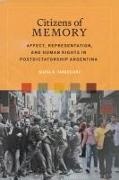Read more
Citizens of Memory explores efforts at recollection in post-dictatorship Argentina and the hoped-for futures they set in motion. The sites, images, narratives, and practices it analyzes address the dark years of state repression (1976-1983) while engaging ongoing debates about how this traumatic past should be transmitted to future generations. This insightful study approaches cultural recall via two theoretical principles—the first understands memory as a social construct that is as much about the past as it is of the present, and the second observes that what distinguishes memory from history is affect. Understanding recollection and storytelling as practices that can help constitute communities of belonging, Tandeciarz suggests that by inciting deep reflection and an active engagement with the legacies of state violence, interventions like those studied here may advance transitional justice and contribute to the construction of less violent futures.
Published by Bucknell University Press. Distributed worldwide by Rutgers University Press.
List of contents
- List of Figures
- A Note on Translation
- Introduction
- Abbreviations
- 1. Making Space for Recollection
- 2. Mnemonic Hauntings: Photography as Art of the Missing
- 3. Archaeologies of Identity: The After Generation’s Archival Returns
- 4. Purgatorio as Memoryscape: Literature, Exile, and the Project of Transnational Justice
- 5. Affective Transmissions: Toward a Pedagogy of Human Rights
- Bibliography
- Index
- About the Author
About the author
Silvia R. Tandeciarz is a chancellor professor of modern languages and literatures and vice dean for social sciences and interdisciplinary studies at William & Mary in Williamsburg, Virginia.

